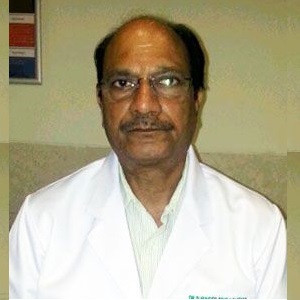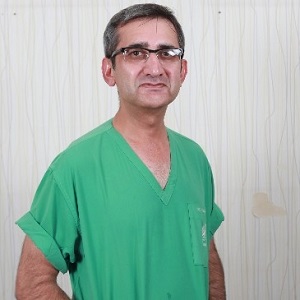Best Doctors in India for Alcoholic Hepatitis Treatment
- Ophthalmologist, Eye Surgeon, Gurugram, India
- Over 20 years’ experience
Profile Highlights:
- Dr. Naginder Vashisht underwent observership in Vitreo-retina and ocular trauma under the guidance of Dr. Robert Morris, MD at Retina Specialist of Alabama, USA. Furthermore, he obtained his fellowships from the International Council of Ophthalmology (London) and the Royal College of Physicians and Surgeons of Glasgow.
- Dr. Vashisht’s area of interest in Ophthalmology includes Phacoemulsification, Uvea, Vitreo-retina, and Ocular trauma, and he also has numerous complex and advanced retinal surgeries to his credit. His specialization is in the management of diabetic eye conditions, eye trauma, and retinopathy of prematurity.
- Transplant Surgeon, Mumbai, India
- Over 30 years’ experience
Profile Highlights:
- Dr. Anil Vaidya is a renowned pancreas transplant surgeon who has performed over 1000 surgeries in the UK and US.
- He is one of the best Transplant Surgeons in India and is an expert in all aspects of intestinal transplantation, pancreas transplantation, and using auto transplantation methods.
- Vascular Surgeon, Gurugram, India
- Over 38 years’ experience
Profile Highlights:
- Dr. Surinder Singh Khatana is an eminent name in the country for conducting more than 1000 vascular surgeries to date.
- He has been the chief cardiac surgeon at various prestigious hospitals both nationally and internationally.
- He has served in the Indian Army for 30 years.
- Nephrologist, Gurugram, India
- Over 18 years’ experience
Profile Highlights:
- Currently working as Associate Director, Nephrology at Medanta, Gurugram; Dr. Jha has several years of rich experience in his field.
- His area of expertise is renal transplantation, hemodialysis, chronic kidney diseases, and acute kidney injury. Throughout his career, he has treated thousands of patients from all over the country and also provides his patients with the best medical care.
- Dr. Jha completed DNB Nephrology from Manipal Hospital; Bengaluru in 2011. He has wide experience in pre as well as post-transplant care.
- Dermatologist, Gurugram, India
- Over 18 years’ experience
Profile Highlights:
- Dr. Pooja Aggarwal has a rich experience as a dermatologist, trichologist, dermato-surgeon, and cosmetologist.
- She has been trained by an esteemed faculty of the prestigious All India Institute of Medical Sciences which has the best dermatology department in India.
- She has some publications to her credit in the field of vasculitis and adverse drug reactions.
- Neurosurgeon, New Delhi, India
- Over 27 years experience
Profile Highlights:
- Dr. Pranav Kumar is one of the best Neurosurgeons in India, having a good success record of over 27 years in performing deep-rooted tumors in the skull.
- Since 1996, Dr. Kumar has been working as a senior consultant neurosurgeon at Apollo Hospital, New Delhi.
- Dr. Pranav Kumar is skilled in surgeries for brain tumors deep-seated at the base of the skull and aneurysms affecting the cerebrovascular system.
- Dr. Kumar specializes in performing the complex ‘Auditory Brainstem Implant,’ where a Bionic device is inserted in the brainstem to recover the hearing capacity in deaf patients who cannot be treated with a cochlear implant.
- He completed microsurgery training at the National Neurosurgical Centre at Beaumont Hospital in Ireland.
- Radiation Oncologist, Chennai, India
- Over 10 years’ experience
Profile Highlights:
- Dr. Ashwathy Susan Mathew has been an eminent doctor hailing from the Department of Radiation Oncology Apollo Proton Cancer Centre, Chennai.
- She has performed extensive research in the diagnosis and treatment of Gastro-Intestinal Cancers and related metastasis.
- She has been awarded the Parvati Devi Gold Medal for Best Paper at the 34th Annual Conference of the Association of Radiation Oncologists of India.
- General Surgeon, Advanced Laparoscopic Surgeon, New Delhi, India
- Over 23 years’ experience
Profile Highlights:
- Dr. Faisal Mumtaz is a General Surgeon based in New Delhi and has an experience of 23 years in this field.
- Dr. Faisal Mumtaz practices at Indraprastha Apollo Hospitals, New Delhi.
- He completed his MBBS from Aligarh Muslim University in 1991 and MS – General Surgery from Aligarh Muslim University in 1994.
- He is a member of the Association of surgeries of India and Laparoscopic treatment of cholecystogastric fistula, Surgical Laparoscopy, and Endoscopy.
- Some of the services provided by Dr. Faisal Mumtaz are Piles Surgery, Endosurgery, Incisional Hernia, Breast Reduction Surgery, Vaser Liposuction, etc.
- Obstetrician & Gynaecologist, Chennai, India
- Over 22 years’ experience
Profile Highlights:
- Dr. Meenakshi Sundaram is a gynecologist and obstetrician in Chennai and has over 22 years of experience in these fields.
- She completed her MBBS from the Medical University (TNMGRMU) and Completed her MD in Obstetrics and Gynecology (Obstetrics and Gynecology) Medical University (TNMGRMU).
- Some of the services provided by the doctor are: Uterine Fibroid Treatment, Uterine Artery Ligation
- Medical Gastroenterologist, Hepatologist, New Delhi, India
- Over 35 years experience
Profile Highlights:
- Dr. Sanjay Sikka is a general physician who specializes in medical gastroenterology. He is a gastroenterologist and hepatologist with over 32 years of experience in liver disease, therapeutic endoscopy, and gastrointestinal consultations.
- Dr. Sikka is practicing as a senior consultant in the Gastroenterology department at Indraprastha Apollo Hospitals, New Delhi.
- Being Professor at the GSUM Medical College in Kanpur, Dr. Sanjay Sikka was also involved in scholarly activity. He has several papers that appeared in numerous national and international periodicals.
Best Hospitals in India for Alcoholic Hepatitis Treatment
ALCOHOLIC HEPATITIS
Alcoholic hepatitis is a liver infection, which is mainly caused by frequent, heavy use of alcohol. Fat can build up in the liver cells, which might lead to inflammation as well as scarring of the liver.
Alcoholic hepatitis might be mild or severe. A patient might even need a liver transplant if proper treatment is not provided, or if they don’t stop consumption of alcohol.
It is also notable that all heavy drinkers don’t develop this condition, and sometimes this condition even develops in people who drink moderately. However, if you are diagnosed with this condition, it is important for you to quit drinking alcohol. People who continue drinking alcohol might face a huge risk of serious liver damage as well as death.
Symptoms
Depending on the amount of damage to the liver, the symptoms can vary. If you are having a mild form of the disease, you might not even experience any symptoms at all. However, as the damage continues to grow, you might experience the following:
- Changes in appetite
- Dry mouth
- Weight loss
- Pain or swelling in the abdomen
- Jaundice, or yellowing of the skin or eyes
- Fever
- Nausea and vomiting
- Easy bleeding or bruising
- Changes in your mental state, including confusion
- Fatigue
The symptoms of this condition are similar to those caused by a few other health conditions. Therefore, if you develop any of these symptoms, it is best to get a proper diagnosis as well as begin treatment.
Causes & risk factors
Alcoholic hepatitis generally develops when the alcohol you drink causes damage to your liver. However, it is not clear why alcohol does this damages only to some heavy drinkers.
Few factors that are known to play a role in this condition include:
- The body’s process that breaks down alcohol produces some toxic chemicals
- These chemicals can trigger inflammation that can destroy the liver cells
- Thus, over time, scars replace healthy liver tissue, thus interfering with the function of the liver
- This irreversible scarring, which is also termed cirrhosis, is the final stage of alcoholic liver disease
If you have hepatitis C and continue to drink, even moderately, you are more likely to develop cirrhosis.
Some heavy drinkers are also malnourished because they don’t eat a proper balanced diet. Alcohol and its byproducts also prevent the body from absorbing nutrition properly. Lack of nutrition can contribute to liver cell damage.
Some other risk factors that can lead to this condition include:
- Your sex- Women are usually at a higher risk of developing alcoholic hepatitis since the way alcohol is processed in women is different.
- Binge drinking- Having over five drinks within two hours for men and four or more for women can increase the risk of alcoholic hepatitis.
- Obesity- Heavy drinkers who are overweight are also more likely to develop alcoholic hepatitis and to progress from that condition to cirrhosis.
- Race and ethnicity- Hispanic and Negroid people might be at higher risk of alcoholic hepatitis.
- Genetic factors- According to studies, there may be a genetic component in alcohol-induced liver disease. However, it is difficult to separate genetic and environmental factors.
Diagnosis
If you are showing symptoms of alcoholic hepatitis, your doctor will first inquire about your medical history and alcohol consumption. Next, he/she will perform a physical exam to see if you have an enlarged liver or spleen. They might also need a few more tests to confirm your diagnosis, such as:
- Complete blood count (CBC)
- Liver function test
- Ultrasound of the liver
- Abdominal CT scan
- Blood clotting tests
In some cases, a liver biopsy might also be needed to confirm the diagnosis of alcoholic hepatitis. A liver biopsy requires your doctor to remove a tissue sample from your liver, which is then tested in the lab. This method helps to show the severity and type of liver disease.
Treatment
Stopping alcohol consumption is the most important treatment for alcoholic hepatitis. There is no cure for this condition, but treatment can help in reducing or eliminating symptoms, or stopping its progression.
It is also important to note that scarring of the liver is permanent, but treatment can aim to restore as much function as possible.
Dietary changes
Medication
Liver transplant
The best hope of recovery is to be aware of the signs and symptoms as well as to reduce, manage, or if possible, completely stop consumption of alcohol.
Complications
Alcoholic hepatitis might lead to severe other complications such as:
- Enlarged veins (varices)- In this condition, blood that is unable to flow freely through the portal vein, can back up into other blood vessels in your esophagus or stomach.
- Hepatic encephalopathy- This condition can be caused by the buildup of toxins if your damaged liver is unable to remove all the toxins from your body. It involves confusion, drowsiness, and slurred speech.
- Ascites- Ascites is a condition in which the fluid that accumulates in the abdomen may get infected and thus, require treatment with antibiotics. Although this condition is not life-threatening, it can be a sign of advanced alcoholic hepatitis, or cirrhosis.
- Kidney failure- A damaged liver affects blood flow to the kidneys, thus resulting in kidney failure.
- Cirrhosis- The scarring of the liver might lead to liver failure.
Prevention
Alcoholic hepatitis might be prevented if you take the following steps:
- Drink alcohol in moderation, if at all- For healthy adults, moderate drinking means no more than one drink a day for women of all ages and men older than 65, and not over two drinks a day for men aged 65 and younger. However, if you prevent all alcohol, it is a certain way to prevent this condition.
- Check before mixing medications and alcohol- Ask your doctor if it’s safe to drink alcohol while you are taking medications. Consider reading the warning labels on over-the-counter medications as well. Don’t drink alcohol when you are taking medications that warn of complications when combined with alcohol.
- Protect yourself from hepatitis C- Hepatitis C is an infectious liver disease that is caused by a virus. If it is left untreated, it may lead to cirrhosis. If you are having hepatitis C and you consume alcohol, you’re generally more likely to develop cirrhosis than if you don’t drink.















